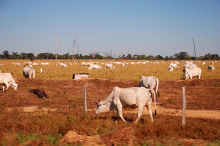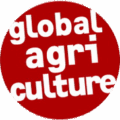
Feeding a growing world population in 2050 without the need to clear forests is possible, also with organic farming, if we cut down on meat, new research shows. Scientists at the Alpen-Adra University in Vienna looked at 500 different scenarios taking into account a variety of key factors such as future yields, land-use intensity, various livestock systems, the area needed for farming and grazing, as well as human diets (vegan, vegetarian, modest consumption of meat, current consumption patterns). Human diets are the key factor, the research team reported on April 19 in the journal Nature Communications. “If the world’s population followed a vegan diet, all combinations of parameters, even those with lowest yield levels and low cropland expansion, would be feasible”, explained Karlheinz Erb, the lead author of the study. “With a vegetarian diet, 94 per cent of all of our calculated scenarios would be feasible.” The results of the study show that producing enough food for almost 10 billion people by 2050 without deforestation becomes increasingly difficult the more meat is consumed. Because of the amount of land it takes to raise animals for meat, only 15% of the scenarios with typical meat-heavy Western diets were feasible – and only with intensive levels of agricultural management as well as massive expansion of cropland into areas now used for grazing. Whereas the vegan diet require less cropland than in the year 2000, meat-based diets would lead to a cropland demand of up to 23.5 million square kilometres, 52 per cent above the current levels. Going vegetarian would allow for an area around the size of India to return to nature. The scientists stress that it is not even necessary to give up meat completely to preserve forests since almost two thirds of the scenarios would still be feasible if meat consumption was reduced to levels in line with public recommendations for a healthy diet. Livestock farming can also produce positive effects, they argue, For instance, livestock can use areas that are not suitable for any other agricultural use except extensive grassland management and increase food availability. However, this benefit is lost if animals are fed with concentrated feedstuff based on cereals grown on arable land. According to the study, feeding 10 billion people in a zero-deforestation world is also possible with lower-yielding agriculture such as organic farming if paired with a vegetarian or vegan diet. While they assumed lower yields for organic farming in industrialized systems compared to business-as-usual trajectories they wrote that regions with little industrialized agriculture would not be affected by yield reductions. Another important factor is the reduction of food waste. The reseachers concluded that if current trends of meat consumption continue, feeding the world in 2050 without clearing forests and converting grasslands into arable land will not be possible. However, their findings illustrate that the United Nations Sustainable Development Goals (SDGs) of protecting forests and the climate are compatible with the aim of achieving food security for a growing population if we reduce meat consumption and tackle food waste. (ab)
